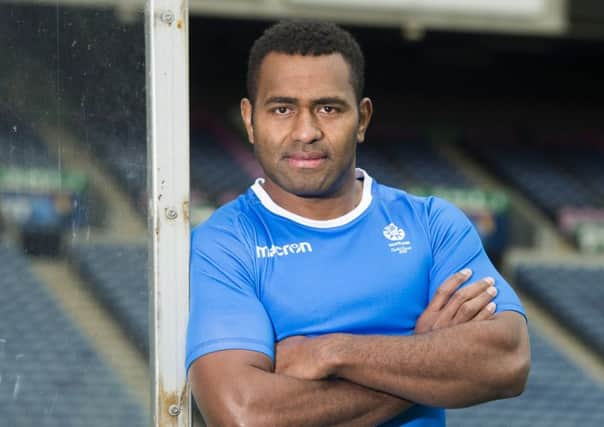Fijian Jo Nayacavou flies Saltire for Scotland rugby sevens


Jo Nayacavou grew up dreaming of playing for the Flying Fijians but an U21 trial was the closest he got. Even now the hurt of that rejection can be heard in his voice. Instead he chose a career in the British Army and made his first ever appearance for Scotland at the Gold Coast back in 2013 in the IRB’s series. Five years on he has returned there, a proud member of Scotland’s Commonwealth Games squad.
“I still have that memory in my head,” says the big man. “The Gold Coast will always be a special place for me, because it’s where I first pulled on the thistle. I’ve still got fond memories of the stadium where we played and the whole environment.
Advertisement
Hide AdAdvertisement
Hide Ad“To be involved in this Commonwealth Games, I’m grateful for the opportunity and really excited to be representing Team Scotland. I could never have imagined in my wildest dreams that I would be going back as a Team Scotland athlete. It’s been a long journey, five years in the making with Scotland Sevens.
“I got as far as the final trials for the [Fiji] under 21s in XVs before I left. That’s still a bad one. I thought I would have got in. But I’ve now been in Scotland since 2008, I’ve got my wife and my two kids and we’ve never looked back since. We’ve loved every minute… except for the cold!”
Nayacavou qualifies for his adopted country thanks to the residency rule after joining the army and being based with 2 Scots at the Glencorse barracks in Penicuik. Back home he grew up almost next door to Netani Talei, former Fiji captain and Edinburgh No.8 who was so impressive during that Heineken Cup run of 2012.
When Phil Greening took on the Scotland Sevens, he asked Talei if he knew any potential Fijian recruits in Scotland, and the burly eight immediately fingered his former neighbour from back home and the call-up for Scotland saved Nayacavou from a second tour of Afghanistan. The Fijian says that he enjoyed his first tour of duty but you can’t blame him for preferring to tour with Scotland Sevens instead.
The big man now sees Scotland as a “second home”. His wife returned to Fiji for the birth of their daughter but his five-year-old son is Scottish-born, both kids sport Scottish accents and they are not the only ones. Nayacavou inevitably attracts attention when travelling with the team and is frequently asked where he comes from? Adopting his broadest Scottish accent, the Fijian’s stock response is: “I’m fae Penicuik”… which usually ends the conversation.
The cultural appropriation works both ways. For his part “Big Joe” has the Scots getting accustomed to drinking Kava. Fiji’s “national drink” is made from the roots of a plant, it looks and tastes like dishwater, albeit boasting some mild relaxing/numbing qualities.
The Scots will steer clear of anything stronger than isotonic drinks and protein shakes until after the tournament that has them seeded in Pool A alongside South Africa, Papua New Guinea and Malaysia. The sports start next Saturday with the Aussie hosts kicking things off with a game against Samoa. England are pooled with Australia, New Zealand with Canada while Fiji must find a way past Wales before facing Sri Lanka and Uganda. The women have an eight-team tournament, without Scotland).
The Scots play PNG first and South Africa last, with Malaysia the filler in the middle of that sandwich. Only the group winner progresses to the medal semi-finals, so no one can afford a slow start, which could produce a few nerves, or so you’d think. “I’m never nervous when I go out to play for us [Scotland],” says Nayacavou, “but I’m still nervous when I watch Fiji play. I’m always a Fiji sevens fan.
Advertisement
Hide AdAdvertisement
Hide Ad“I’ve played them more than few times now and it’s that idea of revenge that comes in. I grew up thinking I would represent them, but I didn’t, and I know I’m with Scotland so I want to show them what they’re missing.
“I’ve still got the respect from them, and that’s why the Fiji and Scotland teams are so close. All the other teams are so jealous because we speak to each other often, we train together, have a beer together after the game… maybe a Kava.”
There is little doubt that Scotland’s recruit is understandably motivated by a desire to prove himself to his fellow countrymen and there is no doubting his importance to his adopted nation. Scotland’s attack can become a little lateral at times and the power of their import adds options along with the offload that seems to come as a birthright for most islanders.
Back at the 2016 Wellington Sevens, Sonny Bill Williams was drafted in ahead of the Olympics and everyone marvelled at his offloading… at least until Nayacavou split two Japanese defenders and threw a no-look, pop-pass out the back of his hand for Nick McLennan on the switch to score the equaliser. The Fijian went on to score the winner in extra time and you can check it out on YouTube.
The beauty of this sevens competition is that any one of about eight teams could win it. Kenya, South Africa and Canada sevens are better than their 15-a-side team, New Zealand, Scotland, England and the fans’ favourite. There are no prizes for guessing who Fiji’s number one fan is backing.
“That’s what I’ve been telling everyone,” replies Nayacavou when someone suggests that this Games is Fiji’s target. “This is the big one for them because it’s the only medal they’ve not won.
“They’ve won everything else apart from the Commonwealth Games. Every [Commonwealth] Games they’ve been to, they’ve come second to New Zealand. This is definitely the big one.”